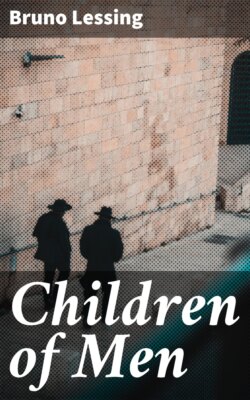Читать книгу Children of Men - Bruno Lessing - Страница 7
На сайте Литреса книга снята с продажи.
IV
ОглавлениеTable of Contents
The newspapers the next day were full of the amazing story of the stolen painting. They told how the attendants at the gallery had discovered the break in the line of paintings and had immediately notified the manager of the place, who at once asked the number of the picture.
“It’s number thirty-eight,” they told him. He seized a catalogue, turned to No. 38, and turned pale. “It’s Corot’s ‘Spring Twilight!’” he cried. “It cost the owner three thousand dollars, and we’re responsible for it!”
The newspapers went on to tell how the police had been notified, and how the best detectives had been set to work to trace the stolen painting, how all the thieves’ dens in New York had been ransacked, and all the thieves questioned and cross-questioned, all the pawnshops searched—and it all had resulted in nothing. But such excitement rarely leaks into the Ghetto, and Braun, at his machine, heard nothing of it, knew nothing of it, knew nothing of anything in the world save that the machines were roaring away in his brain and that Lizschen was dying. As soon as his work was done he went to her. She smiled at him, but was too weak to speak. He seated himself beside the bed and took her hand in his. All day long she had been looking at the picture; all day long she had been wandering along the road that ran over the hill, and now night had come and she was weary. But her eyes were glad, and when she turned them upon Braun he saw in them love unutterable and happiness beyond all description. His eyes were dry; he held her hand and stroked it mechanically; he knew not what to say. Then she fell asleep and he sat there hour after hour, heedless of the flight of time. Suddenly Lizschen sat upright, her eyes wide open and staring.
“I hear them,” she cried. “I hear them plainly. Don’t you, Liebchen? The sheep are coming! They’re coming over the hill! Watch, Liebchen; watch, precious!”
With all the force that remained in her she clutched his hand and pointed to the painting at the foot of the bed. Then she swayed from side to side, and he caught her in his arms.
“Lizschen!” he cried. “Lizschen!” But her head fell upon his arm and lay motionless.
The doctor came and saw at a glance that the patient was beyond his ministering. “It is over, my friend,” he said to Braun. At the sound of a voice Braun started, looked around him quite bewildered, and then drew a long breath which seemed to lift him out of the stupor into which he had fallen. “Yes, it is over,” he said, and, according to the custom of the orthodox, he tore a rent in his coat at the neck to the extent of a hand’s breadth. Then he took the painting under his arm and left the house.
It was now nearly two o’clock in the morning and the streets were deserted. A light rain had begun to fall, and Braun took off his coat to wrap it around his burden. He walked like one in a dream, seeing nothing, hearing nothing save a dull monotonous roar which seemed to come from all directions and to centre in his brain.
The doors of the gallery were closed and all was dark. Braun looked in vain for a bell, and after several ineffectual taps on the door began to pound lustily with his fist and heel. Several night stragglers stopped in the rain, and presently a small group had gathered. Questions were put to Braun, but he did not hear them. He kicked and pounded on the door, and the noise resounded through the streets as if it would rouse the dead. Presently the group heard the rattling of bolts and the creaking of a rusty key in a rusty lock, and all became quiet. The door swung open, and a frightened watchman appeared.
“What’s the matter? Is there a fire?” he asked.
A policeman made his way through the group, and looked inquiringly from Braun to the watchman. Without uttering a word Braun held out the painting, and at the sight of it the watchman uttered a cry of amazement and delight.
“It’s the stolen Corot!” he exclaimed. Then turning to Braun, “Where did you get it? Who had it? Do you claim the reward?”
Braun’s lips moved, but no sound came from them, and he turned on his heel and began to walk off, when the policeman laid a hand on his shoulder.
“Not so fast, young man. You’ll have to give some kind of an account of how you got this,” he said.
Braun looked at him stupidly, and the policeman became suspicious. “I guess you’d better come to the station-house,” he said, and without more ado walked off with his prisoner. Braun made no resistance, felt no surprise, offered no explanation. At the station-house they asked him many questions, but Braun only looked vacantly at the questioner, and had nothing to say. They locked him in a cell over night, a gloomy cell that opened on a dimly lighted corridor, and there Braun sat until the day dawned, never moving, never speaking. Once, during the night, the watchman on duty in this corridor thought he heard a voice whispering “Lizschen! Lizschen!” but it must have been the rain that now was pouring in torrents.
